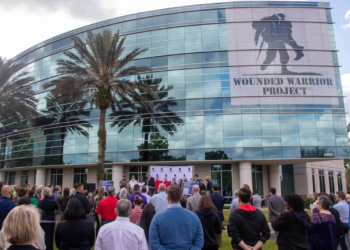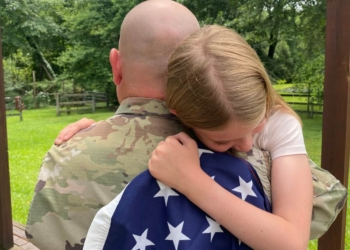Many Americans may find it hard to believe that 1 in 3 active-duty military members who send their kids to Department of Defense schools struggle to feed their families, according to a report from the Government Accountability Office (GAO). Rather than correcting this problem, many families feel shamed into remaining silent. New legislation hopes to put an end to financial shaming and bring this issue into the light.
In the U.S., 12% of the population deal with food insecurity, which Feeding America describes as when people can’t access the food they need to live their fullest lives.
This problem is exacerbated by the ever-changing nature of the military lifestyle. Military members have to worry if their children will go hungry while their spouses, who studies say are already stressed during deployments, will be left alone struggling to make the most out of every penny, often in a new community.
When Tess Graniglia’s husband enlisted in the Air Force as an E-2 in February 2019, they believed that they were making a wise financial choice for them and their 2-year-old daughter.
“One of the many reasons we joined the military was the financial security. We did not know a lot of other things,” she said. “For instance, our recruiter told us that all medical, vision and dental would be covered by the military and they are, for my husband.”

“The other big expense is the moving expense,” Graniglia continued. Her family moved from Georgia to Monterey, California, in April 2019 and is still waiting to be reimbursed. “It has been three or four months. That’s like $5,000 out of pocket.” Although service members are eligible to receive a pay advance to cover these costs, this is not always explained to new recruits, who also do not know to ask.
Military life is riddled with communal knowledge, known as “gouge,” and often it is only through this “pass down” that military members discover what their benefits actually are. While basic pay and allowances are easily searchable online. What is not straightforward are the unforeseen costs associated with living in high-income areas of the country and frequent out-of-pocket moving expenses.
With factors like frequent moves, military spouse unemployment, distance from family, high childcare costs, many families are left without many freedoms their civilian counterparts enjoy.
“It would actually end up costing us money for me to work” said Graniglia.
Shame is not only felt by these families, but it is also often inflicted, with many opponents to pay increases blaming the victims. “A lot of people are like, ‘you just need to learn to budget,’” Graniglia added.
Politicians on both sides of this issue passionately defend their stance. The White House “strongly objects” to a pay increase for these families stating that, “most junior enlisted members receive pay that is between the 95th and 99th percentiles relative to their private-sector peers.” What this calculation may not consider is the totality of what is required of military families.
“Most American families are two income families. Yet in military families more and more of the spouses cannot work because they are moving all the time and can’t develop and grow their careers. Military families are one income families,” said Sen. Tammy Duckworth, D-IL. “You are comparing apples and oranges.”

“This is an issue where spouses feel embarrassed to talk about. This issue is very silent. Not many people know about it, and you don’t really talk about it,” said Megan Gatzke, an Air Force spouse living at Vandenberg Air Force Base in Santa Barbara County, California. Gatzke founded COLA for Cali, a popular Facebook group that introduces the idea that some areas of the country should qualify for a Cost of Living Allowance (COLA), similar to what is offered to military members living abroad.
Members of the group share food bank information, encourage each other to reach out to politicians and provide a shame-free forum that combats the stigma of military financial insecurity.
“The fact that you have people living in trailers either because there is no room on base or because they are needing to use their BAH money to pay for food is a huge problem. That is not something everyone wants to talk about,” Gatzke continued.
While overall military compensation is seen as the root of this food insecurity issue, politicians are hoping to provide more immediate support through introducing legislation. Duckworth sponsored a bill that would have removed Basic Allowance for Housing (BAH) from Supplemental Nutrition Assistance Program (SNAP) eligibility calculations.
This calculation proves problematic when living in high-cost areas with higher BAH rates. Most junior enlisted personnel at such locations live in military housing, forfeiting their entire BAH. In low-cost areas, some families choose to live in more affordable off-installation housing and put any “leftover” BAH towards food expenses.
Duckworth’s proposed legislation was opposed by Senate Republicans earlier this month, but a companion bill is still moving forward in the House of Representatives.
Congresswoman Susan Davis, D-Ca, of San Diego sponsored the Military Hunger Prevention Act which was added to the 2020 National Defense Authorization Act (NDAA) in early July. This act differs from Duckworth’s bill in that it would address more than SNAP eligibility and would actually increase some military pay.
“It [Military Hunger Prevention Act] would provide a plus up to the base pay for service members who are at or below 130% of the federal poverty line … So for example, in enlisted members, an E-4 with four years of service … with three dependents, we’d be talking about a benefit of about $234 a month just to get them up to 130 percent of the federal poverty line,” said Josh Protas, vice president of Public Policy with MAZON: A Jewish Response to Hunger.
Financial instability not only affects individual families, but military readiness and retention. Severe financial difficulty “is actually one of the disqualifying factors for getting a security clearance … it is not just a shame issue, but an issue that affects their ability to do their jobs,” said Duckworth. “It is going to affect recruiting … who wants to join the military if they know that potentially they will have to use a food pantry in order to feed their families?”
Serving in the military requires a lot from military members and their families. Financial education is available but may not be enough to make a difference. According to Gatzke, one of the mottos of COLA for Cali is “It’s either California or Leavenworth [military prison]. You don’t have a way to leave California if you are stationed here … you can’t walk away from your post [without going to prison].”



































